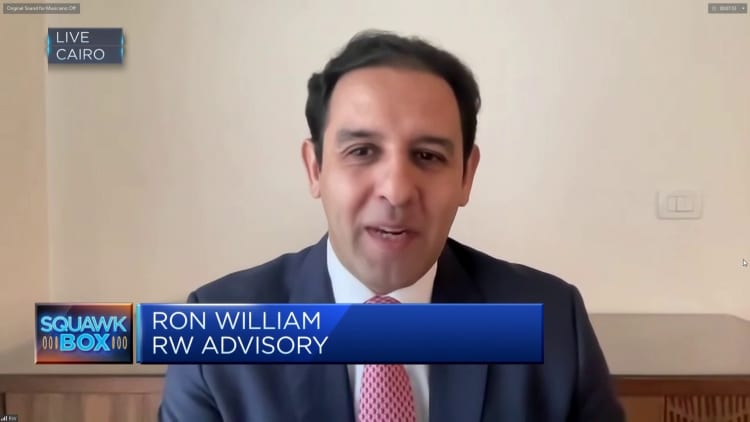With U.S. Federal Reserve officials expecting to cut interest rates in 2024, there are steps investors can take now to prepare.
The central bank's latest summary of economic projections, issued in December, indicates three cuts may be coming this year. This assumes each is a quarter-percentage-point decrease.
The Fed began raising borrowing costs aggressively in March 2022 to tame inflation. Inflation has since declined significantly from pandemic-era highs, and keeping interest rates too elevated risks tipping the U.S. into recession.
More from Personal Finance:
2024 is the 'year of globetrotting.' Here are some of the hot spots
Here are some moves investors can make when the market is soaring
4 factors that affect how much Social Security income retirees will get in 2024
A cut in 2024 would be the first since the early days of the Covid-19 pandemic, when the Fed slashed rates to near zero to bolster the economy. Of course, there's still ample uncertainty over how soon and how quickly the Fed may cut rates this time around.
Here's what financial advisors say investors need to know.
Stocks' runup likely won't persist
Falling interest rates are generally a boon for the stock market, advisors said. Among the reasons: Businesses can borrow money more cheaply and are more likely to make big investments in their companies as a result.
However, 2024 is unlikely to see a repeat of stocks' stellar performance from last year, advisors said.
The S&P 500 U.S. stock index rose 24% in 2023 following a year-end rally. That surge was partly forward-looking, reflecting investors' expectations for lower interest rates in 2024.
"The stock market is the great anticipation machine," said Charlie Fitzgerald III, a certified financial planner based in Orlando, Florida.

"If anyone was trying to time the market, they may have missed it already," added Fitzgerald, a founding member of Moisand Fitzgerald Tamayo. "Because it's what happened in the fourth quarter."
Of course, that doesn't mean all market growth is in the rearview mirror. But don't make the mistake of buying stocks with the expectation of them continuing to rise, he said. That tendency is called recency bias.
That said, growth stocks like those in the technology sector are more likely to benefit from lower interest rates than value stocks, said Ted Jenkin, CFP, the founder of oXYGen Financial in Atlanta and a member of CNBC's Advisor Council.
Now is the time to lock in CD rates
Cash and cash-like investments — such as high-yield savings accounts, money market funds and certificates of deposit — were among the big beneficiaries of rising interest rates. Rates on cash jumped to their highest level in years.
However, those rates are likely to fall once the Fed starts cutting borrowing costs.
"If you can lock in CD rates [at current levels], this is probably a good time to do it," Jenkin said. "There are still a lot of places that offer 5%."
Savers aren't getting much more interest on longer-term CDs, like those with a five-year term, versus a shorter-term, one-year CD, for example — so it may make more sense to opt for one with a shorter term, Jenkin said.
Bonds are poised to pop
Bonds got clobbered by the Fed's interest-rate-hiking cycle.
That's because bond prices move opposite to interest rates. It's like a seesaw: When interest rates rise, bond prices fall.
The share prices of bond mutual funds and exchange-traded funds sank in 2022, the worst-ever year for U.S. bonds.
The stock market is the great anticipation machine.Charlie Fitzgerald IIIcertified financial planner
Now, if interest rates fall, bond funds are poised for a rebound, advisors said.
An environment of gradually falling interest rates "is an easy place to make money in the bond market without a whole bunch of risk," Fitzgerald said.
Those with a strong conviction that interest rates will fall may consider buying funds with a longer maturity, which would generally benefit more from declining rates, Jenkin said. However, they also carry more risk, he said.
REITs are another likely beneficiary of rate cuts
Real estate investment trusts are also poised to do well amid falling interest rates, Jenkin said.
"This is one of the top moves I'd be making with my money" if expecting rates to fall, he added.
The REIT sector "depends highly on the debt market to carry out business activities," and such companies therefore "benefit from lower borrowing costs," according to Zacks Equity Research.
For investors who buy, it would perhaps make more sense to do it in a retirement account like an individual retirement account or 401(k) plan, so the dividends aren't taxable until later, Jenkin said.
As with any of these recommendations, it's important to make investment decisions within the construct of a diversified portfolio, Fitzgerald said.
Hold an adequate amount of stocks in your portfolio relative to your age and time horizon, be disciplined and don't freak out if and when the market goes down, he added.


